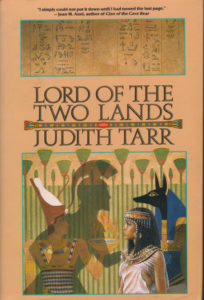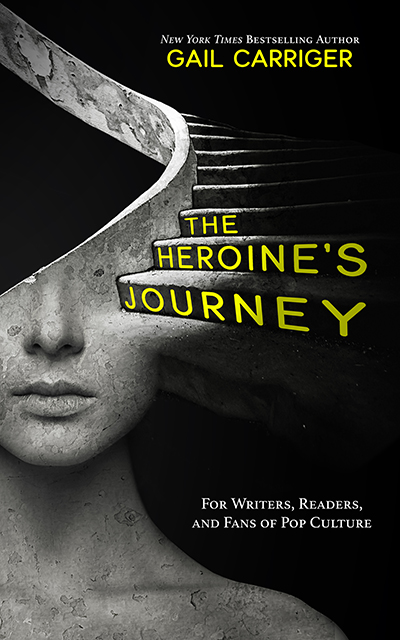Recently I poked my nose into a local book group.
I enjoy these kinds of things so much. I wish I had the time and friendship group able to undertake such a gathering regularly locally. (More on that to come next week.)
I’ve visited one or two book groups in the past but they have always read and then wished to discuss my own books.
This time I got to pick someone else’s book. And I chose Judith Tarr’s The Lord of Two Lands.

I’ve reviewed this book before and while I love it, Publisher’s Weekly is not so kind.
At the book group we talked a great deal about Egyptian mythology and the history of Alexander the Great. I realized that I appreciate this book a more for having a working knowledge of both. (Speaking of here’s The rise and fall of the Macedonian Empire in pictures.) I now think a better book fro beginners not already vested in the history, that still tackles the changing ways of Ancient Egypt is the excellent YA novel Mara: Daughter of the Nile. So if you picked up The Lord of Two Lands and struggled with it, I urge you to try Mara instead.
Some of the things mentioned in the book discussion:
- Appreciation for Tarr’s skill with description.
“Spirit goes sour fast in a harem. It goes to wine or it goes to fat, or it takes to poisoning people.” - How much wordage she “wastes” on side characters never to be seen again. And yet it’s still riveting. This is not something authors often can (or are allowed to) get away with.
“He was old, thin-limbed but heavy-bellied, in a coat so rich it seemed to parody itself: deep crimson silk crusted with embroidery. He made Meriamon think of the baboon in Thoth’s temple, irascible and holy, with his too-long arms and his withered face.” - The concept of distance or legend writing. A style particularly prevalent in fantasy where the reader is shown the word as if through the mists of time, a slight fog that lends a lyrical note to the writing but also a lack of intimacy. We discussed the Mists of Avalon as a prime example of this kind of writing. Some of the other readers had a very hard time relating to Meriamon, the protagonist because of this sensation. I did not. Possibly because one of my favorite books of all time, The Forgotten Beast of Eld, is a perfect example of this style of legend narrative. Just so we are clear, this is not a style I feel comfortable writing myself. And when I have tried in the past, it comes off as stilted. I do not have Tarr’s deft had with prose.
- The brevity with which Tarr can transmit profound emotion amazes me. Niko, for example, is always described in words of anger. And yet you are in no doubt of his profound love for Meri.
““You’re sick.” Niko kept on holding her. Rocking her, even. His face was never as gentle as his arm was, holding her in its curve, cradling her in his lap. He looked furious.” - Tarr’s use of short punchy sentence structure, lots of fragments. Our love for the character of Sekhmet the cat who is always characterized by this brevity.
“Sekhmet walked the length of her body, light-footed, lambent-eyed.” - I spoke at length about how I thought that due to the Egyptian concept of multiple souls and the characterization of Meri’s shadow, that Meri herself is constantly walking the line between life and death. That her powers come from that, as do her sacrifices. Her shadow leaves her when she is ill partly because that line is so fragile. His presence as the scion of death would hinder her recovery. Yet she is so accustomed to the other kind of strength his presence transfers (that of bridging the gap, and spiritual power) that she panics at his loss. This is a classic struggle in Ancient Greek plays for the oracle archetype who is both profound, powerful, and damaged: Kassandra, for example, or the Blind Fates. In the male hero’s journey this can often take the form of physical travel to the underworld (a brutal in-your-face metaphor), but the best female characters are written into a chronic state between words. I see Meri, in many ways, as a classic liminal character ~ treading between life and death, male and female, Greek and Egyptian, fragile and strong.
This is one of those times when I want to sit the author down and ask her about her intent.
Was Tarr aware of accessing these tropes or is it me reading too much into it? She seems so well educated in the classics I must assume she knows.
And yet, does that matter?
I remember Mike doing an academic piece on my use of the New Woman Archetype in the Alexia books. Frankly, I have no idea what he’s talking about, but he made me sound so very smart. And if he read my intent in accessing the New Woman, does it matter that I was unaware myself? After all in writign a book, my words become the readers to interpret. Are they really mine anymore?
If the author is unaware of the percussive nature of her work does that lessen the impact?
And with that philosophical thought, I leave you.
BOOK DE JOUR
- Tired of the hero’s journey?
- Frustrated that funny, romantic, and comforting stories aren’t taken seriously?
- Sad that the books and movies you love never seem to be critically acclaimed, even when they sell like crazy?
The Heroine’s Journey is here to help.
Multiple New York Times bestselling author Gail Carriger presents a clear concise analysis of the heroine’s journey, how it differs from the hero’s journey, and how you can use it to improve your writing and your life.
GAIL’S DAILY DOSE
Book News:
Tags: Book Review, Established Authors


Oh wow! I am always excited by a book featuring Alexander the Great. I shall rush off to Amazon this very moment. Do you know of Mary Renault's brilliant books, Fire From Heaven and The Persian Boy? I think you might like them…
I do indeed. But it is her "Last of the Wine" that I love most.
Always lovely to find another lover of "The Forgotten Beasts of Eld" – it has one of my favorite qualities in a book – the feeling as if you were reading a dream – where a certain something in the narrative always feels just out of reach – in a good way.Glad to learn there is an actual literary term for it.
An understandable feeling. Last of the Wine is incredible.